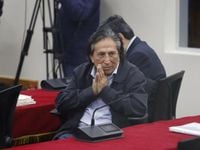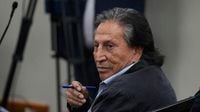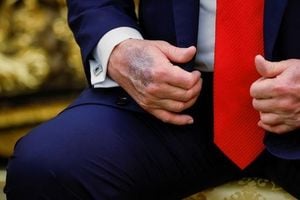Peru’s political landscape has once again been rocked by the reverberations of a long-running corruption scandal, as former President Alejandro Toledo faces a second prison sentence for his involvement in the notorious Odebrecht affair. On September 4, 2025, a Peruvian court sentenced Toledo to 13 years and four months for money laundering, marking his second conviction tied to the sprawling web of bribery and illicit dealings that has ensnared much of the country’s leadership over the past two decades, according to Al Jazeera and ABC.
Toledo, who governed Peru from 2001 to 2006, was found guilty of using millions in bribe money from the Brazilian construction giant Odebrecht—now known as Novonor—to acquire high-value real estate in Lima. Prosecutors detailed how Toledo and his wife funneled $5.1 million through an offshore company in Costa Rica, using the illicit funds to buy a house and an office in an upscale neighborhood and to pay off mortgages on two other properties (Al Jazeera, AFP).
This latest sentence comes less than a year after Toledo was handed a 20-year and six-month prison term in October 2024 for bribery and corruption. Authorities accused the former president of accepting up to $35 million from Odebrecht in exchange for awarding the company a lucrative contract to build a 650-kilometer (403-mile) highway connecting Brazil with southern Peru. The road project, initially estimated to cost $507 million, ultimately ballooned to a staggering $1.25 billion, leaving taxpayers footing the bill for the inflated costs (AP, AFP).
Throughout his yearlong trial, Toledo, now 79, consistently denied the charges of money laundering and collusion brought by prosecutors. Nevertheless, Judge Josefa Izaga ruled that the evidence was sufficient to convict. Both sentences are to be served concurrently, meaning Toledo will serve the longer term rather than face consecutive punishments (AP, AFP).
Toledo’s downfall is just the latest chapter in a saga that has gripped Peru and much of Latin America. The Odebrecht scandal, part of the broader "Car Wash" (“Lava Jato”) investigation, has implicated governments across the region. In 2016, Odebrecht admitted to U.S. authorities that it had paid enormous bribes to win government contracts throughout Latin America, sparking investigations that spread from Mexico to Ecuador and beyond. In Peru alone, four former presidents—including Toledo—have been accused of accepting illicit payments from the company (AP).
According to AP, the U.S. Department of Justice’s investigation into Odebrecht’s practices revealed a pattern of corruption that left countries paying far more for infrastructure projects than initially planned. Roads, bridges, and other public works became vehicles for bribery, with politicians benefiting at the expense of the public. The 650-kilometer highway at the center of Toledo’s case became a symbol of both progress and betrayal for many Peruvians.
After leaving office in 2006, Toledo moved to California and returned to Stanford University, his alma mater, as a visiting scholar. For years, he managed to evade Peruvian justice, even as the net tightened around him. In 2019, however, authorities arrested him at his California home. Initially held in solitary confinement at a county jail east of San Francisco, Toledo was later released to house arrest in 2020 due to his age, declining health, and the COVID-19 pandemic (AP).
But the legal battle was far from over. In 2023, following a court of appeals’ decision to deny his challenge against extradition, Toledo surrendered to U.S. authorities and was sent back to Peru to face trial. He is currently serving his sentence at a prison on a Lima police base, a facility that also houses other former Peruvian leaders, including Ollanta Humala and Pedro Castillo (AFP, Al Jazeera).
The Odebrecht scandal’s reach has been profound. Just months ago, former President Ollanta Humala received a 15-year sentence for laundering funds from the company to finance his 2006 and 2011 election campaigns. Another ex-president, Pedro Pablo Kuczynski, now 86, is on trial with prosecutors seeking a 35-year sentence for his alleged role in the scheme. As AFP notes, nearly every Peruvian president this century has been implicated in the scandal in some form.
Even as Toledo began his prison term, the country’s political turmoil continued. On September 3, 2025, former President Martin Vizcarra was released from the same police base facility while awaiting trial for allegedly taking bribes more than a decade ago. Vizcarra, who was jailed last month, has denied the charges, calling them political persecution. He had hoped to run for president again in 2026 (AFP).
The scale of the Odebrecht affair is almost hard to fathom. The company, once a titan of Latin American infrastructure, admitted to paying hundreds of millions of dollars in bribes to secure government contracts across the continent. In Peru, the impact has been especially acute, with public trust in political leaders eroded by repeated revelations of graft and self-dealing. As Al Jazeera reported, the scandal has "tainted Peru’s political landscape," leaving citizens disillusioned and angry at a system that seems to reward corruption at the highest levels.
Toledo’s academic credentials—he holds degrees from Stanford and the University of San Francisco—once set him apart as a technocrat and reformer. But his legacy is now defined by his conviction. During his trial, Toledo maintained his innocence, but the court found the evidence of money laundering and collusion overwhelming. Prosecutors argued that the sophisticated use of offshore companies and real estate purchases was designed to obscure the origins of the bribe money, further aggravating the offense (AFP, Al Jazeera).
With Toledo’s sentencing, Peru joins a growing list of countries forced to confront the corrosive effects of the Odebrecht scandal. The case has exposed the vulnerabilities of political systems across Latin America, highlighting the need for stronger institutions, greater transparency, and a renewed commitment to public accountability. For many Peruvians, the hope is that these high-profile convictions will serve as a deterrent—though the road to restoring trust is long and fraught with challenges.
As another former leader begins a lengthy prison sentence, Peru’s struggle with corruption remains front and center. The Odebrecht scandal, with its far-reaching consequences, continues to shape the nation’s politics and its future. Only time will tell if the lessons of this era will lead to lasting change.





